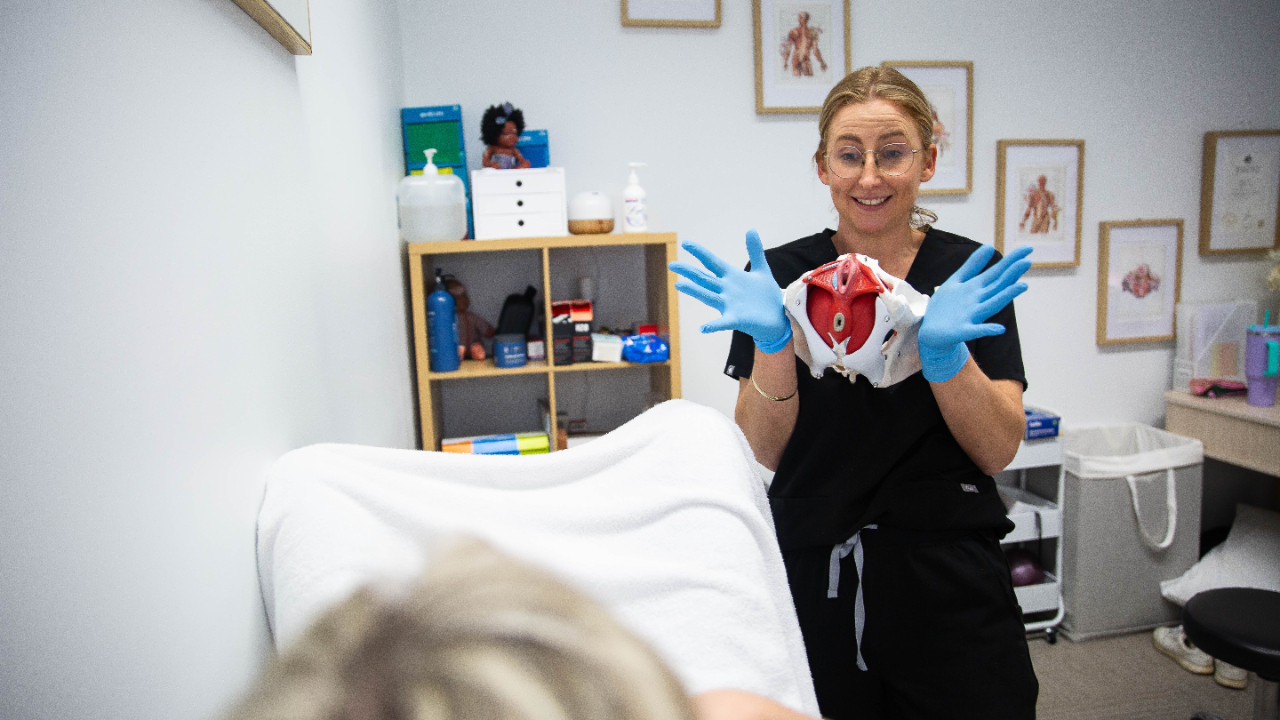
Pelvic Floor Physiotherapy: A complete guide to Pelvic Health
Sep 17, 2025When most people think of physiotherapy, they imagine treatment for back pain, sports injuries, or joint issues. But did you know that physiotherapists also specialize in pelvic floor physiotherapy, a highly specialized area that supports bladder, bowel, and sexual health, as well as pregnancy and postnatal recovery?
AKA Women’s health physiotherapy, Pelvic health physiotherapy and/or Pelvic floor physiotherapy (we tend to use the terms interchangeably).
At Fit 2 Function Allied Health, our pelvic health physiotherapists in Tamworth, Manilla, and Armidale help people of all ages with conditions that often go undiscussed, but have a huge impact on daily life.
In this guide, we’ll explore what pelvic floor physiotherapy involves, and the many conditions pelvic health physios can treat.
What is Pelvic Floor Physiotherapy?
The pelvic floor is a group of muscles, ligaments, and tissues that support your bladder, bowel, and reproductive organs. These muscles need to be strong and coordinated, but also able to relax. Dysfunction of the pelvic floor can cause a wide range of symptoms, from leakage to pain.
A pelvic floor physiotherapist is trained to assess and treat these issues using evidence-based strategies such as:
- Individualized exercise programs targeting both the pelvic floor and musculoskeletal system as a whole
- Education and lifestyle advice ranging from bladder and bowel health to stress management and many things in between (including how to poop!) which all impact heavily on your pelvic health
- Manual therapy including muscle work both internally and externally, techniques on the pelvic girdle, abdominal wall, thoracic spine can all impact the pelvic floor
- Biofeedback and real-time ultrasound for assessment and training as well as therapeutic ultrasound for management of certain conditions e.g. mastitis, hemorrhoids.
Conditions Treated by Pelvic Health Physiotherapists
1. Urinary Incontinence
Bladder leakage is common but not normal. Our physiotherapists help with stress incontinence (leakage when coughing, sneezing, or exercising) and urge incontinence (strong, sudden urges), mixed urinary incontinence (both). With targeted pelvic floor training, bladder retraining, and use of devices where needed we can target and effectively treat urinary incontinence.
2. Pelvic Organ Prolapse
Prolapse occurs when the bladder, uterus, or bowel bulges into the vaginal wall. Symptoms may include heaviness, dragging, or bulging. A pelvic physio can help manage prolapse with pelvic floor strengthening, lifestyle modifications, and fitting of a support pessary.
3. Pelvic Pain
Chronic/persistent pelvic pain, painful intercourse (dyspareunia), vulvodynia, and endometriosis-related pain can be improved with physiotherapy. Treatment differs for each individual and is likely to focus on pelvic floor relaxation and optimization, gentle stretching, pain education and bladder and bowel health.
4. Bowel Dysfunction
Constipation, faecal incontinence, and difficulty emptying the bowel (often resulting in hemorrhoids &/or fissures) can be linked to pelvic floor dysfunction. Physiotherapists provide strategies to improve bowel habits, retrain coordination, and reduce straining.
5. Pregnancy & Postnatal Care
Pregnancy places huge demands on the pelvic floor. Physiotherapy can help during pregnancy with pelvic girdle pain, abdominal separation (diastasis recti), appropriate exercise and birth preparation. After birth, we support recovery with a thorough pelvic floor postnatal assessment, incontinence and prolapse management, healing of abdominal separation and exercise guidance.
6. Birth Preparation
Pelvic physiotherapy involvement in your maternity care is an exciting development ensuring your pelvic floor is prepared for birth and the skills for birth are learned prior to labour beginning. We are also able to assess and then mitigate your risk of sustaining pelvic floor trauma.
7. Sexual Dysfunction
Pain with intimacy or difficulties with arousal can sometimes be linked to pelvic floor dysfunction. Physiotherapy provides strategies for women to improve comfort and confidence.
Why See a Pelvic Floor Physiotherapist?
Pelvic floor issues are common, but often go untreated because people feel embarrassed to seek help. The good news is that early intervention can significantly improve symptoms and quality of life.
If you are experiencing leakage, pain, heaviness, constipation, or difficulties with intimacy, a pelvic health physiotherapist can help.
Our Pelvic Health Clinics in Tamworth, Manilla & Armidale
Fit2Function Allied Health provides specialized pelvic floor physiotherapy across regional NSW, ensuring rural communities have access to high-quality care without needing to travel to metropolitan centers.
Whether you are seeking help with postnatal recovery, birth preparation, incontinence, prolapse, or pelvic pain, our team is here to support you with compassion, discretion, and evidence-based care.
Book Your Pelvic Health Consultation
Don’t suffer in silence. Take the first step toward better pelvic health today.
👉 Book an appointment at our Tamworth, Manilla, or Armidale clinics to start your recovery.
Book now!

